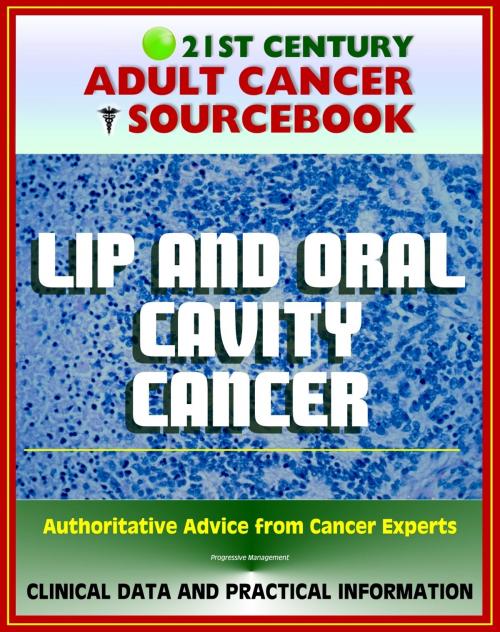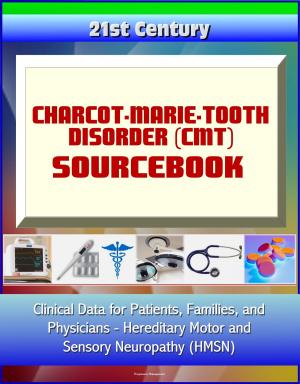21st Century Adult Cancer Sourcebook: Lip and Oral Cavity Cancer - Clinical Data for Patients, Families, and Physicians
Nonfiction, Health & Well Being, Health, Ailments & Diseases, Cancer| Author: | Progressive Management | ISBN: | 9781465887313 |
| Publisher: | Progressive Management | Publication: | October 13, 2011 |
| Imprint: | Smashwords Edition | Language: | English |
| Author: | Progressive Management |
| ISBN: | 9781465887313 |
| Publisher: | Progressive Management |
| Publication: | October 13, 2011 |
| Imprint: | Smashwords Edition |
| Language: | English |
Authoritative information and practical advice from the nation's cancer experts about lip and oral cavity cancer includes official medical data on signs, symptoms, early detection, diagnostic testing, risk factors and prevention, treatment options, surgery, radiation, drugs, chemotherapy, staging, biology, prognosis, and survival, with a complete glossary of technical medical terms and current references.
Starting with the basics, and advancing to detailed patient-oriented and physician-quality information, this comprehensive in-depth compilation gives empowered patients, families, caregivers, nurses, and physicians the knowledge they need to understand the diagnosis and treatment of lip and oral cavity cancer.
Comprehensive data on clinical trials is included - with information on intervention, sponsor, gender, age group, trial phase, number of enrolled patients, funding source, study type, study design, NCT identification number and other IDs, first received date, start date, completion date, primary completion date, last updated date, last verified date, associated acronym, and outcome measures.
Early cancers (stage I and stage II) of the lip and oral cavity are highly curable by surgery or by radiation therapy, and the choice of treatment is dictated by the anticipated functional and cosmetic results of treatment and by the availability of the particular expertise required of the surgeon or radiation oncologist for the individual patient. The presence of a positive margin or a tumor depth of more than 5 mm significantly increases the risk of local recurrence and suggests that combined modality treatment may be beneficial.
Advanced cancers (stage III and stage IV) of the lip and oral cavity represent a wide spectrum of challenges for the surgeon and radiation oncologist. Except for patients with small T3 lesions and no regional lymph node and no distant metastases or who have no lymph nodes larger than 2 cm in diameter, for whom treatment by radiation therapy alone or surgery alone might be appropriate, most patients with stage III or stage IV tumors are candidates for treatment by a combination of surgery and radiation therapy. Furthermore, because local recurrence and/or distant metastases are common in this group of patients, they should be considered for clinical trials. Such trials evaluate the potential role of radiation modifiers or combination chemotherapy combined with surgery and/or radiation therapy.
Extensive supplements, with chapters gathered from our Cancer Toolkit series and other reports, cover a broad range of cancer topics useful to cancer patients. This edition includes our exclusive Guide to Leading Medical Websites with updated links to 81 of the best sites for medical information, which let you quickly check for updates from the government and the best commercial portals, news sites, reference/textbook/non-commercial portals, and health organizations. Supplemental coverage includes:
Levels of Evidence for Cancer Treatment Studies
Glossary of Clinical Trial Terms
Clinical Trials Background Information and In-Depth Program
Clinical Trials at NIH
How To Find A Cancer Treatment Trial: A Ten-Step Guide
Taking Part in Cancer Treatment Research Studies
Access to Investigational Drugs
Clinical Trials Conducted by the National Cancer Institute's Center for Cancer Research at the National Institutes of Health Clinical Center
Taking Time: Support for People with Cancer
Facing Forward - Life After Cancer Treatment
Chemotherapy and You
Authoritative information and practical advice from the nation's cancer experts about lip and oral cavity cancer includes official medical data on signs, symptoms, early detection, diagnostic testing, risk factors and prevention, treatment options, surgery, radiation, drugs, chemotherapy, staging, biology, prognosis, and survival, with a complete glossary of technical medical terms and current references.
Starting with the basics, and advancing to detailed patient-oriented and physician-quality information, this comprehensive in-depth compilation gives empowered patients, families, caregivers, nurses, and physicians the knowledge they need to understand the diagnosis and treatment of lip and oral cavity cancer.
Comprehensive data on clinical trials is included - with information on intervention, sponsor, gender, age group, trial phase, number of enrolled patients, funding source, study type, study design, NCT identification number and other IDs, first received date, start date, completion date, primary completion date, last updated date, last verified date, associated acronym, and outcome measures.
Early cancers (stage I and stage II) of the lip and oral cavity are highly curable by surgery or by radiation therapy, and the choice of treatment is dictated by the anticipated functional and cosmetic results of treatment and by the availability of the particular expertise required of the surgeon or radiation oncologist for the individual patient. The presence of a positive margin or a tumor depth of more than 5 mm significantly increases the risk of local recurrence and suggests that combined modality treatment may be beneficial.
Advanced cancers (stage III and stage IV) of the lip and oral cavity represent a wide spectrum of challenges for the surgeon and radiation oncologist. Except for patients with small T3 lesions and no regional lymph node and no distant metastases or who have no lymph nodes larger than 2 cm in diameter, for whom treatment by radiation therapy alone or surgery alone might be appropriate, most patients with stage III or stage IV tumors are candidates for treatment by a combination of surgery and radiation therapy. Furthermore, because local recurrence and/or distant metastases are common in this group of patients, they should be considered for clinical trials. Such trials evaluate the potential role of radiation modifiers or combination chemotherapy combined with surgery and/or radiation therapy.
Extensive supplements, with chapters gathered from our Cancer Toolkit series and other reports, cover a broad range of cancer topics useful to cancer patients. This edition includes our exclusive Guide to Leading Medical Websites with updated links to 81 of the best sites for medical information, which let you quickly check for updates from the government and the best commercial portals, news sites, reference/textbook/non-commercial portals, and health organizations. Supplemental coverage includes:
Levels of Evidence for Cancer Treatment Studies
Glossary of Clinical Trial Terms
Clinical Trials Background Information and In-Depth Program
Clinical Trials at NIH
How To Find A Cancer Treatment Trial: A Ten-Step Guide
Taking Part in Cancer Treatment Research Studies
Access to Investigational Drugs
Clinical Trials Conducted by the National Cancer Institute's Center for Cancer Research at the National Institutes of Health Clinical Center
Taking Time: Support for People with Cancer
Facing Forward - Life After Cancer Treatment
Chemotherapy and You















